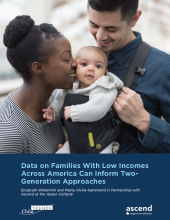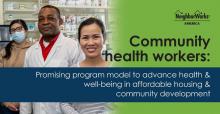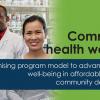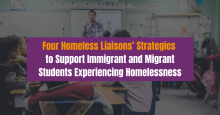0
Publication
Community:
Sep 5, 2023
Join the Housing Is Working Group for webinars, member updates, and round table discussions! This resource provides the 2023-2024 Calendar of Events.
Authored by: Housing Is
Topics: CLPHA, Education, Housing, Workforce development
 Shared by Camille Anoll-Hunter
Shared by Camille Anoll-Hunter
Camille Anoll-Hunter posted a
on Sep 5, 2023
Join the Housing Is Working Group for webinars, member updates, and round table discussions! This resource provides the 2023-2024 Calendar of Events.
0
Publication
Community:
Jan 18, 2024
Marjorie Sims, Sarah Haight
January 2024
Focused on the 23,306 young parents (ages 18 to 24) and their families in New Mexico, this report provides a framework for organizations in New Mexico to collaborate more effectively and offers a plan of action to assess these efforts and strengthen impact for families.
This publication aims to deepen understanding about the demographics, aspirations, and needs of young parents; highlights practices and policies aligned with a two-generation (2Gen) approach; showcases opportunities to streamline this work by forging connections between organizations and state systems; and offers recommendations across sectors and at all levels.
Suggested Reference: Suggested Reference: Sims, M. & Haight, S. (2024). Meeting Young Parents Where They Dream: A Collaborative Framework for a 2Gen Approach in New Mexico. Washington, DC.
Authored by: Marjorie Sims, Sarah Haight
Topics: Child welfare, Dual-generation, dual-generation initiative, Early childhood, Family engagement, Healthy homes, Housing
 Shared by Molli Caite Hughes
Shared by Molli Caite Hughes
Molli Caite Hughes posted a
on Jan 18, 2024
Marjorie Sims, Sarah Haight
Marjorie Sims, Sarah Haight
January 2024
Focused on the 23,306 young parents (ages 18 to 24) and their families in New Mexico, this report provides a framework for organizations in New Mexico to collaborate more effectively and offers a plan of action to assess these efforts and strengthen impact
0
Publication
Community:
Nov 15, 2023
Homelessness and child welfare system involvement pose substantial challenges for families, but supportive housing can help them stay together and access secure housing.
Authored by: Michael Pergamit, Mary K. Cunningham for Urban Institute
Topics: Advocacy, Dual-generation, Healthy homes, Homelessness, Housing, Low-income, Stability
 Shared by Molli Caite Hughes
Shared by Molli Caite Hughes
Molli Caite Hughes posted a
on Nov 15, 2023
Michael Pergamit, Mary K. Cunningham for Urban Institute
Homelessness and child welfare system involvement pose substantial challenges for families, but supportive housing can help them stay together and access secure housing.
0
Report
Community:
Nov 14, 2023
As the frequency and severity of weather and climate hazards rises, fully understanding and planning for their potential impact on affordable housing is critical.
This report examines the risks that natural hazards pose to federally assisted housing and its residents using Federal Emergency Management Agency's National Risk Index (NRI).
Authored by: A joint report by The Public and Affordable Housing Research Corporation & The National Low Income Housing Coalition
Topics: Environmental Resiliency/Climate Change, Housing
 Shared by Molli Caite Hughes
Shared by Molli Caite Hughes
Molli Caite Hughes posted a
on Nov 14, 2023
A joint report by The Public and Affordable Housing Research Corporation & The National Low Income Housing Coalition
As the frequency and severity of weather and climate hazards rises, fully understanding and planning for their potential impact on affordable housing is critical.
This report examines the risks that natural hazards pose to federally assisted housing and its residents using Federal Emergency Managem
0
Publication
Community:
Aug 3, 2023
A Community Health Worker Program Development & Toolkit for Affordable Housing and Community Development Organizations
Authored by: NeighborWorks America
Topics: Health, Healthy homes, Housing
 Shared by Camille Anoll-Hunter
Shared by Camille Anoll-Hunter
Camille Anoll-Hunter posted a
on Aug 3, 2023
A Community Health Worker Program Development & Toolkit for Affordable Housing and Community Development Organizations
0
Report
Community:
May 17, 2023
Researchers at UC Berkeley’s Youth and Allies Against Homelessness, or YAAH, conducted a study to better understand how the COVID-19 pandemic disproportionately affected unhoused youth and their ability to transition out of homelessness and into adulthood. YAAH released a report Wednesday to suggest how to better support this community in the future.
Authored by: UC Berkeley's Youth Allies Against Homelessness for The Daily Californian
Topics: Broadband, COVID-19, Food insecurity, Health, Homelessness, Housing, Low-income, Mental health, Racial inequalities, Youth
 Shared by Sandra Ware
Shared by Sandra Ware
Sandra Ware posted a
on May 25, 2023
UC Berkeley's Youth Allies Against Homelessness for The Daily Californian
Researchers at UC Berkeley’s Youth and Allies Against Homelessness, or YAAH, conducted a study to better understand how the COVID-19 pandemic disproportionately affected unhoused youth and their ability to transition out of homelessness and into adulthood.
0
Publication
Community:
Mar 2, 2023
Many students and families arrive in the U.S. from other countries without safe, stable housing, and experience homelessness and high mobility that can last for months. At SchoolHouse Connection, we recognize the crucial role that schools can play in providing stability and support to mitigate the disruption and trauma caused by homelessness. This page is dedicated to providing educators, policymakers, and advocates with valuable resources on how to best support these families and youth, and help ensure that all students have the opportunity to succeed in school and beyond.
Authored by: School House Connection
Topics: Early childhood, Education, Grade-level proficiency, Homelessness, Housing, Immigrants, Legislation & Policy, School-readiness, Youth
 Shared by Sandra Ware
Shared by Sandra Ware
Sandra Ware posted a
on Mar 14, 2023
Many students and families arrive in the U.S. from other countries without safe, stable housing, and experience homelessness and high mobility that can last for months.
0
Report
Community:
Mar 1, 2023

We are delighted to share a new research report in partnership with Child Trends: Data on Families with Low Incomes Across America Can Inform Two-Generation Approaches. In this new analysis, research experts Elizabeth Wildsmith and Marta Alvira-Hammond paint a detailed picture of how families in households with low incomes in the United States have changed since 2011. The report highlights 10 key findings from their analyses of family economic and social conditions related to financial security and mobility, family structure and living arrangements, education and employment, parental health, and community health indicators (for example, rates of child poverty, violent crime, child care costs). A deeper understanding of families with low-incomes will inform our collective work and strengthen how our 2Gen policy and practice recommendations can prioritize health, education, employment, and economic assets to ensure families have access to the resources they need to build intergenerational prosperity and well-being.
Authored by: Elizabeth Wildsmith and Marta Alvira-Hammond for Child Trends in partnership with Ascend at the Aspen Institute
Topics: dual-generation initiative, Early childhood, Education, Health, Housing, Legislation & Policy, Low-income, Racial inequalities
 Shared by Sandra Ware
Shared by Sandra Ware
Sandra Ware posted a
on Mar 2, 2023
Elizabeth Wildsmith and Marta Alvira-Hammond for Child Trends in partnership with Ascend at the Aspen Institute
We are delighted to share a new research report in partnership with Child Trends: Data on Families with Low Incomes Across America Can Inform Two-Generation Approaches.
0
Report
Community:
Mar 1, 2023
At this time of year, pull up to a busy intersection or pass by some popular public gathering place in and around Durham, and there’s a good chance you might find a sign advertising “PreK for All.” January kicks off Durham PreK’s annual recruitment campaign for the approaching school year, and if you have a rising preschooler in your life, you may be wondering what it means to offer pre-k for all.
The resulting report, “Toward Equity in Durham PreK: Addressing the Accessibility of Wraparound Care as a Barrier to Universal PreK in Durham,” details the findings, identifies key program participation challenges tied to wraparound care access and availability, and offers conclusions and recommendations for addressing these challenges now and in the future.
Authored by: Child Care Services Association (CCSA)
Topics: COVID-19, Early childhood, Education, Funding, Housing, Legislation & Policy, Low-income, Racial inequalities
 Shared by Sandra Ware
Shared by Sandra Ware
Sandra Ware posted a
on Mar 2, 2023
Child Care Services Association (CCSA)
At this time of year, pull up to a busy intersection or pass by some popular public gathering place in and around Durham, and there’s a good chance you might find a sign advertising “PreK for All.” January kicks off Durham PreK’s annual recruitment campaign for the approaching school year, and if yo
0
Publication
Community:
Sep 29, 2022
Housing is a complex domain. Solutions that repair our broken housing system will require a collaborative approach to funding and long-term systems change.
Authored by: Funders for Housing and Opportunity for the Stanford Social Innovation Review
Topics: COVID-19, Funding, Housing, Racial inequalities
 Shared by Sandra Ware
Shared by Sandra Ware
Sandra Ware posted a
on Jan 3, 2023
Funders for Housing and Opportunity for the Stanford Social Innovation Review
Housing is a complex domain. Solutions that repair our broken housing system will require a collaborative approach to funding and long-term systems change.
0
Publication
Community:
Oct 6, 2022
How a national funder collaborative is empowering communities, expanding access to housing in BIPOC neighborhoods, and changing policies, narratives, and systems that perpetuate racial injustice.
Authored by: Bea de la Torre for the Stanford Social Innovation Review
Topics: Funding, Housing, Legislation & Policy, Racial inequalities
 Shared by Sandra Ware
Shared by Sandra Ware
Sandra Ware posted a
on Jan 3, 2023
Bea de la Torre for the Stanford Social Innovation Review
How a national funder collaborative is empowering communities, expanding access to housing in BIPOC neighborhoods, and changing policies, narratives, and systems that perpetuate racial injustice.
0
Publication
Community:
Oct 13, 2022
Is the future of philanthropy a more collaborative one? The leaders of Funders for Housing and Opportunity share lessons to help the field learn—and evolve—in real time.
Authored by: Jeanne Fekade-Sellassie & Jennifer Angarita for the Stanford Social Innovation Review
Topics: Community development, Funding, Housing, Legislation & Policy, Racial inequalities
 Shared by Sandra Ware
Shared by Sandra Ware
Sandra Ware posted a
on Jan 3, 2023
Jeanne Fekade-Sellassie & Jennifer Angarita for the Stanford Social Innovation Review
Is the future of philanthropy a more collaborative one? The leaders of Funders for Housing and Opportunity share lessons to help the field learn—and evolve—in real time.
0
Publication
Community:
Oct 20, 2022
Three social change leaders discuss how to move the narrative about housing away from a focus on individual actions toward values, racial justice, and the well-being of all.
Authored by: Glenn Harris, Michael McAfee, & Dorian Warren for the Stanford Social Innovation Review
Topics: Housing, Legislation & Policy, Racial inequalities
 Shared by Sandra Ware
Shared by Sandra Ware
Sandra Ware posted a
on Jan 3, 2023
Glenn Harris, Michael McAfee, & Dorian Warren for the Stanford Social Innovation Review
Three social change leaders discuss how to move the narrative about housing away from a focus on individual actions toward values, racial justice, and the well-being of all.
0
Publication
Community:
Oct 27, 2022
To solve the housing crisis, funders must take collective action to simultaneously solve the climate crisis and prioritize those who have had the least to do with creating either.
Authored by: Dana Bourland for the Stanford Social Innovation Review
Topics: Advocacy, Environmental Resiliency/Climate Change, Green, Housing, Lead, Low-income, Racial inequalities
 Shared by Sandra Ware
Shared by Sandra Ware
Sandra Ware posted a
on Jan 3, 2023
Dana Bourland for the Stanford Social Innovation Review
To solve the housing crisis, funders must take collective action to simultaneously solve the climate crisis and prioritize those who have had the least to do with creating either.
0
Publication
Community:
Nov 10, 2022
Two housing justice advocates discuss different approaches to policy change and the importance of centering the voices of people most affected by systemic barriers and inequities in housing.
Authored by: Amy Gillman, Liz Ryan Murray, & Mike Koprowski for the Stanford Social Innovation Review
Topics: Advocacy, Housing, Legislation & Policy, Low-income, Racial inequalities
 Shared by Sandra Ware
Shared by Sandra Ware
Sandra Ware posted a
on Jan 3, 2023
Amy Gillman, Liz Ryan Murray, & Mike Koprowski for the Stanford Social Innovation Review
Two housing justice advocates discuss different approaches to policy change and the importance of centering the voices of people most affected by systemic barriers and inequities in housing.
0
Publication
Community:
Nov 17, 2022
Lessons for funders and social change leaders in search of the best ways to collaborate across sectors to end homelessness.
Authored by: Seyron Foo, Raji Hunjan, & Amy Kleine for the Stanford Social Innovation Review
Topics: Funding, Homelessness, Housing, Low-income, Supportive housing, Youth
 Shared by Sandra Ware
Shared by Sandra Ware
Sandra Ware posted a
on Jan 3, 2023
Seyron Foo, Raji Hunjan, & Amy Kleine for the Stanford Social Innovation Review
Lessons for funders and social change leaders in search of the best ways to collaborate across sectors to end homelessness.
0
Publication
Community:
Dec 1, 2022
Local initiatives are breaking new ground to make access to housing and opportunity more affordable and equitable and to increase the resources dedicated to housing justice.
Authored by: Mercedeh Mortazavi & Alana Greer for the Sandford Social Innovation Review
Topics: Community development, Housing, Legislation & Policy, Partnerships, Racial inequalities
 Shared by Sandra Ware
Shared by Sandra Ware
Sandra Ware posted a
on Jan 3, 2023
Mercedeh Mortazavi & Alana Greer for the Sandford Social Innovation Review
Local initiatives are breaking new ground to make access to housing and opportunity more affordable and equitable and to increase the resources dedicated to housing justice.
0
Publication
Community:
Nov 3, 2022
In the newly released Stanford Social Innovation Review article, co-authors Jessica Mulcahy, Success Measures at NeighborWorks America; Vedette R. Gavin, Verge Impact Partners; and Stacey Barbas and Kate McLaughlin, The Kresge Foundation discuss their collaborative work on a three-year developmental evaluation to learn about the strategies and approaches grantees are using to advance health equity through housing. This article is part of the series “Collaboration for Housing Justice” sponsored by Funders for Housing and Opportunity to mark their fifth anniversary.
Authored by: Stacey Barbas, Kate McLaughlin, Jessica Mulcahy & Vedette R. Gavin, Stanford Social Innovation Review
Topics: Community development, Health, Housing, Place-based, Racial inequalities, Research
 Shared by Camille Anoll-Hunter
Shared by Camille Anoll-Hunter
Camille Anoll-Hunter posted a
on Dec 15, 2022
Stacey Barbas, Kate McLaughlin, Jessica Mulcahy & Vedette R. Gavin, Stanford Social Innovation Review
In the newly released Stanford Social Innovation Review article, co-authors Jessica Mulcahy, Success Measures at NeighborWorks America; Vedette R.
0
Report
Community:
Sep 27, 2022
Human Rights Watch report on Public housing- How US Underfunding Public Housing Harms Rights in New York, New Mexico, and Beyond
Authored by: Human Rights Watch
Topics: Funding, Housing, Low-income, Racial inequalities, Research
 Shared by Sandra Ware
Shared by Sandra Ware
Sandra Ware posted a
on Oct 11, 2022
Human Rights Watch report on Public housing- How US Underfunding Public Housing Harms Rights in New York, New Mexico, and Beyond
0
Report
Community:
Sep 22, 2022
New research from Urban Institute housing experts explores the characteristics of youth and young adults living in federally assisted housing and the neighborhoods in which they live. Stable housing is essential for young people as they transition from adolescence to adulthood, and public housing agencies often play a critical role in providing them with affordable homes. In 2021 alone, 755,000 youth (people ages 14 to 18) and 513,000 young adults (people ages 19 to 25) received federal housing assistance. Youth and young adult heads of household in federally assisted housing tend to have extremely low incomes. They are less likely to live in metropolitan areas, and 11 percent were experiencing homelessness at the time of their admission into housing. Little information is available about these young people and their experiences accessing stable and affordable housing, and this brief demonstrates that more work must be done to guide service providers, advocates, and policymakers to strengthen supports and services.
If you have questions or would like to speak with the research team, please email me at aelsbree@urban.org.
Authored by: Olivia Fiol, Matthew Gerken, Susan J. Popkin, and Abby Boshart for THE URBAN INSTITUTE
Topics: Child welfare, Housing, Stability, Youth
 Shared by Sandra Ware
Shared by Sandra Ware
Sandra Ware posted a
on Oct 4, 2022
Olivia Fiol, Matthew Gerken, Susan J. Popkin, and Abby Boshart for THE URBAN INSTITUTE
New research from Urban Institute housing experts explores the characteristics of youth and young adults living in federally assisted housing and the neighborhoods in which they live.
0
Report
Community:
Jun 29, 2022
Looking largely at the 2020-2021 school year, the report is chock-full of information about how schools apply research-based strategies in a variety of different contexts – from very different school systems across multiple states – to make research translate into positive experiences and outcomes for students and their teachers in three critical areas:
• Instructional work, where math or English-language-arts teams, including instructional coaches, special-education teachers, and English learner/multilingual teachers, work to improve the quality of instruction within classrooms.
• Early Warning and Response strategies, where grade-level or cross-functional teams work to create more supportive school environments, where young people are connected to adults, each other, and the school community.
• Well-Matched Postsecondary initiatives, where school-based teams of counselors, service providers, district and school leaders, teachers, and other staff band together to implement evidence-based strategies and processes that support postsecondary application, enrollment, and persistence.
At its heart, improvement is about learning. Each of these networks study their own work, and consistently and strategically make adaptations to increase their effectiveness as the organizational hub supporting schools. And they demonstrate how lessons need not fade away, but when codified, systematized, and shared, they can deepen our collective capacity to accelerate the field’s learning and growth.
Authored by:
Topics: Advocacy, Attendance, Child welfare, CLPHA, Community development, Education, Grade-level proficiency, Housing, Literacy, Low-income, Partnerships, Place-based, Supportive housing, Sustainability, Youth
 Shared by Karina George
Shared by Karina George
Karina George posted a
on Jun 29, 2022
Looking largely at the 2020-2021 school year, the report is chock-full of information about how schools apply research-based strategies in a variety of different contexts – from very different school systems across multiple states – to make research translate into positive experiences and outcomes f
0
Report
Community:
Jun 27, 2022
We have an abundance of talent that is ready to reimagine early childhood and well-being in America for our youngest children and families, but we do not have an abundance of leadership experiences that nurture, propel, and position them as the dynamic leaders our country urgently needs.
Leadership that reflects the full diversity and genius of our communities, sectors, identities, and lived experiences matters now more than ever. In Toward A More Equitable Tomorrow: A Landscape Analysis of Early Childhood Leadership, we uncover the essentials for future leadership investments that value and center equity—especially racial equity and inclusion—to surface new possibilities and equitable prosperity moving forward. Insights from stakeholders including state and federal cabinet directors, service providers, funders, and parents offer powerful perspectives to guide the future early childhood field, and guide those who seek to accelerate families’ well-being, educational success, and economic mobility.
Ascend at the Aspen Institute is embracing this moment as a renewal, and also as a redoubling of our commitment to remake our systems and our society. This means centering children and families with a focus not simply on eliminating persistent inequities such as poverty, polarization, and racism, but on ensuring pathways to prosperity and well-being.
With support from the Buffett Early Childhood Fund, David and Lucile Packard Foundation, and the Bezos Family Foundation, Ascend undertook a robust landscape analysis of the early childhood field. More than 80 leaders—from research, practice, policy, philanthropy, and families with young children—shared their insights for this report. It was augmented by a review of 20 mission-aligned leadership efforts. Our inquiry was grounded in an intentional focus on racial, economic, and gender equity; respect for the advances made; commitment to innovation; and an open mind to new approaches, possibilities, and power.
Authored by: Ascend at the Aspen Institute
Topics: Advocacy, Asset building, Child welfare, CLPHA, Early childhood, Housing, Legislation & Policy, Racial inequalities, Research, Supportive housing, Sustainability, Youth
 Shared by Karina George
Shared by Karina George
Karina George posted a
on Jun 27, 2022
Ascend at the Aspen Institute
We have an abundance of talent that is ready to reimagine early childhood and well-being in America for our youngest children and families, but we do not have an abundance of leadership experiences that nurture, propel, and position them as the dynamic leaders our country urgently needs.
0
Report
Community:
Jun 27, 2022
A robust research base indicates the importance of high quality early care and education in relation to a host of long term health, education, and employment outcomes. The concept of “quality” in these programs has been the focus of much attention and resources, particularly over the last decade. Most states have established definitions of quality through quality rating and improvement systems (QRIS) and allocated accompanying resources to support early care and education providers to progress toward higher levels of quality. Unfortunately, with few exceptions, definitions of “quality” have been sorely lacking attention to equity and to the unique experiences that disproportionately affect children from historically marginalized communities.
This report addresses a fundamental content flaw in QRISs by operationalizing equity indicators. These indicators are grounded and organized by the CEP’s 14 priorities to advance equity in early care and education systems, published in a 2020 report, in partnership with eight national organizations. States can use these indicators to inform QRIS redesign efforts to advance equity and improve transparency for families.
Authored by: The Children's Equity Project (CEP)
Topics: Advocacy, CLPHA, Communications, Homelessness, Housing, Legislation & Policy, Metrics, Racial inequalities, Research, Supportive housing, Sustainability
 Shared by Karina George
Shared by Karina George
Karina George posted a
on Jun 27, 2022
The Children's Equity Project (CEP)
A robust research base indicates the importance of high quality early care and education in relation to a host of long term health, education, and employment outcomes. The concept of “quality” in these programs has been the focus of much attention and resources, particularly over the last decade.
0
Publication
Community:
Jun 17, 2021
Authored by: U.S. Department of Housing and Urban Development Choice Neighborhoods
Topics: Attendance, COVID-19, Early childhood, Education, Family engagement, Housing, Low-income, Out-of-school time, Youth
 Shared by Kirsten Greenwell
Shared by Kirsten Greenwell
Kirsten Greenwell posted a
on Jun 17, 2021
U.S. Department of Housing and Urban Development Choice Neighborhoods
0
Report
Community:
May 6, 2021
As evidence grows that housing mobility programs can vastly improve residents’ life trajectories, today the Robert Wood Johnson Foundation, Institute for Health and Social Policy based at Johns Hopkins Bloomberg School of Public Health, and a network of experts released a report to help inform and guide supplementary research on the new Housing Choice Voucher (HCV) Mobility Demonstration Program from the U.S. Department of Housing and Urban Development (HUD).
Including input from leaders in the housing, health, education, and economic development fields, the Report of the Housing Mobility Research Road Map Project provides research considerations for the HCV Mobility Demonstration Program, which will begin funding nine public housing agencies in Spring 2021 to provide housing vouchers and mobility services to help families move to lower-poverty neighborhoods.
Housing mobility programs have the potential to disrupt historic patterns of segregation and increase families’ economic mobility. As these programs are implemented, there will be opportunities for research to inform a broad range of public policies including health, education, and housing policy.
Authored by: Oktawia Wójcik for ROBERT WOOD JOHNSON FOUNDATION & Craig Pollack for JOHNS HOPKINS UNIVERSITY
Topics: Advocacy, Housing, Legislation & Policy, Mobility, Racial inequalities
 Shared by Housing Is
Shared by Housing Is
Housing Is posted a
on May 25, 2021
Oktawia Wójcik for ROBERT WOOD JOHNSON FOUNDATION & Craig Pollack for JOHNS HOPKINS UNIVERSITY
As evidence grows that housing mobility programs can vastly improve residents’ life trajectories, today the Robert Wood Johnson Foundation, Institute for Health and Social Policy based at Johns Hopkins Bloomberg School of Public Health, and a network of experts released a report to help inform and g


 Shared by Camille Anoll-Hunter
on Sep 5, 2023
Shared by Camille Anoll-Hunter
on Sep 5, 2023

 Shared by Molli Caite Hughes
on Jan 18, 2024
Shared by Molli Caite Hughes
on Jan 18, 2024
 Shared by Molli Caite Hughes
on Nov 15, 2023
Shared by Molli Caite Hughes
on Nov 15, 2023
 Shared by Molli Caite Hughes
on Nov 14, 2023
Shared by Molli Caite Hughes
on Nov 14, 2023

 Shared by Camille Anoll-Hunter
on Aug 3, 2023
Shared by Camille Anoll-Hunter
on Aug 3, 2023


 Shared by Sandra Ware
on May 25, 2023
Shared by Sandra Ware
on May 25, 2023


 Shared by Sandra Ware
on Mar 14, 2023
Shared by Sandra Ware
on Mar 14, 2023


 Shared by Sandra Ware
on Mar 2, 2023
Shared by Sandra Ware
on Mar 2, 2023


 Shared by Sandra Ware
on Mar 2, 2023
Shared by Sandra Ware
on Mar 2, 2023


 Shared by Sandra Ware
on Jan 3, 2023
Shared by Sandra Ware
on Jan 3, 2023


 Shared by Sandra Ware
on Jan 3, 2023
Shared by Sandra Ware
on Jan 3, 2023


 Shared by Sandra Ware
on Jan 3, 2023
Shared by Sandra Ware
on Jan 3, 2023


 Shared by Sandra Ware
on Jan 3, 2023
Shared by Sandra Ware
on Jan 3, 2023


 Shared by Sandra Ware
on Jan 3, 2023
Shared by Sandra Ware
on Jan 3, 2023


 Shared by Sandra Ware
on Jan 3, 2023
Shared by Sandra Ware
on Jan 3, 2023


 Shared by Sandra Ware
on Jan 3, 2023
Shared by Sandra Ware
on Jan 3, 2023


 Shared by Sandra Ware
on Jan 3, 2023
Shared by Sandra Ware
on Jan 3, 2023


 Shared by Camille Anoll-Hunter
on Dec 15, 2022
Shared by Camille Anoll-Hunter
on Dec 15, 2022

 Shared by Sandra Ware
on Oct 11, 2022
Shared by Sandra Ware
on Oct 11, 2022
 Shared by Sandra Ware
on Oct 4, 2022
Shared by Sandra Ware
on Oct 4, 2022
 Shared by Karina George
on Jun 29, 2022
Shared by Karina George
on Jun 29, 2022
 Shared by Karina George
on Jun 27, 2022
Shared by Karina George
on Jun 27, 2022
 Shared by Karina George
on Jun 27, 2022
Shared by Karina George
on Jun 27, 2022
 Shared by Kirsten Greenwell
on Jun 17, 2021
Shared by Kirsten Greenwell
on Jun 17, 2021
 Shared by Housing Is
on May 25, 2021
Shared by Housing Is
on May 25, 2021